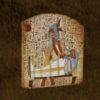Death rites are perhaps the most universal in there nature and there significance. The lore behind death rites is as big as religion, science and magic itself, and the rites of death are really rites of life. They differ as much as the cultures views on life, from the Haitian “birthday” like celebration to an Irish wake.
We can start with views of the body. They differed according to culture and in part according to region. In places where a body kept better there were often beliefs related to a spirit lingering in the body. In places where bodies decayed more rapidly they tended to see death as a form of transformation rather universally, and especially in the places of rapid decay there was speculation about the remaining parts, the skull, the heart, even the spleen.
Probably due to the heart lasting longer than the bones in burning rituals? Yes that’s true, and that raises the beliefs of the Egyptians who practiced ritual burning before they actually began mummification. As the culture evolved so did their beliefs, and a whole culture arose based of insights into life but more specifically into death and the concept of the relationship between life and the after life. The Egyptian book of the dead was not a true codicil of beliefs, and it often differed from person to person. In the Egyptian view there were three souls similar to the Kahuna view, but the Ka (which was part of the personality) was thought to linger in the tomb itself. Thus they built tombs to serve almost as houses, with furniture, possessions, the whole list of things they may have wanted in life.
The idea of the possessions of the dead remaining their rightful belongings wasn’t unique to Egypt. In Native American cultures they treated the deads belongings the same as if they were still alive, and rather like the Vikings they hung them on a burial platform or dressed the mummy in them as some of the dry country tribes did inter there dead in caves where they would mostly just desiccate. One of the widest spread symbols connected to death and the afterlife is the “underworld”. It has been viewed as the land of the dead so commonly that if you dream of being underground or in a cave it’s usually interpreted as a spiritual issue or something ending or transforming.
The most common belief was that the underworld was not just the land of the dead but the place of rebirth. Many Greek mystery cults purposely used select caves for that. It was believed more commonly that rather than having direct contact with the gods, that an oracle had most of their insight by communicating with the wise departed, as did the shamans of the Native American tribes.
They relegate the dead to the ground still today and even in more modern beliefs like Christianity, they say “ashes to ashes, dust to dust”. One belief that is also wide spread but not deliberately universal is often called “familial piety”. This is the concept that the deceased were still involved in the world and needed to be shown respect in ritual form. It is either simple prayers or also potentially includes food offerings. Indians, Chinese, Japanese. All had formal ways of acknowledging their deceased relatives and ancestors. The Aztecs did as well, as did also the Celts and the Norse, as even old forgotten burial mounds were seen to still possess lingering power. Many cultures had a concept of the soul’s inherent power which was often used to explain physical power, as well as unusual insight and influential demeanor.
It went by many names. The dead to the Chinese still had chi. The word luck is originally Norse and meant the spiritual character or karma of a person, not what we use it to mean today. For the followers of Voodoo it’s ashe, for the Kahunas it’s mana, and for Egyptians it’s ka. How this matters today is that they believed that this power didn’t die with the body, potentially lingering on in either the intact body itself or some select part of it like the skull.
Your thoughts are welcome. Be well friends.
Travis Saunders
Dragon Intuitive
~science,mysticism,spirituality~



Leave a Reply